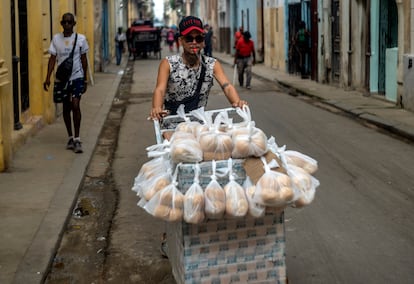Cuba struggles to stay afloat in economic quicksand
The country’s government has enacted desperate measures in another attempt to revive the island’s moribund economy


A little help is all Lucía Caridad Torres wants — help to rebuild her tobacco-drying barn so she can earn a modest living. When Hurricane Ian struck Cuba on September 27, 2022, her barn in the tobacco-rich province of Pinar del Río (western Cuba) was destroyed. She hasn’t been able to plant or harvest any crops since then and no government agency has offered any assistance. “No one really understands what us folks who live off the land have to deal with,” said the 62-year-old woman. Right now, she doesn’t even have the materials to rebuild, let alone access to fertilizer and fuel. “We need fuel to plant our crops. We raise pigs and produce our own food, you know?”
However, there are no signs that things will get better for Cuba’s rural population — the ones that produce the country’s food. The government’s belt-tightening measures announced last December included a 500% fuel price increase, a 25% increase in electricity rates, and higher prices for propane gas. These steps aim to achieve macroeconomic stabilization during this crisis, often likened to the “Special Period” economic depression in the early 1990s following the collapse of the Soviet Union and the loss of its large aid packages.
Is there a political will to open up and diversify the economy, considering the rising cost of living? According to Cuban economist Omar Everleny Pérez Villanueva, the new measures are not only contradictory but also predominantly centered on currency circulation, whereas the focus should be on production. “In the short term, it’s affecting the population, which already has suffered a significant decline in its purchasing power. I don’t see any measures that actually encourage production in the medium to long term.”
Last year, Economy Minister Alejandro Gil warned about the challenging state of the economy. He acknowledged the scarcity of milk, bread, and coffee in Cuban households due to the small monthly rations that the government can no longer subsidize. In 2023, daily egg production dropped to 2.2 million, down from five million in 2020. Only 9,000 tons of coffee were produced, whereas domestic demand is around 24,000 tons. Pork production declined by nearly 90%, and rice and bean production dropped as well. The sugar harvest amounted to less than 350,000 tons, covering less than half of the domestic demand.
These numbers translate into hunger. On July 11, 2021, thousands of Cubans took to the streets in historic protests, shouting “We’re hungry!” and “Freedom!” Over 1,000 protestors were arrested and jailed as political prisoners. Three years later, Cuba’s economy has contracted by 2% despite the government’s 3% growth projections. By the end of 2023, the inflation rate had topped 30%, and the Cuban peso lost more than 50% of its value against the dollar and euro in informal exchange markets.
“There is no political will to embrace the transformations that the national economy needs,” said Cuban economist Mauricio de Miranda. “Extractive institutions are reinforced instead of the inclusive ones that could enable more production. Unfortunately, we have seen that government control measures actually restrict production.” The government has invested in tourism, a sector heavily affected by the pandemic. In 2023, Cuba welcomed 1.8 million tourists, significantly lower than the 4.2 million visitors in 2019.
Cuba’s future looks bleak. The last five years have been marked by poorly conceived government corrections, ineffective economic measures, sanctions by the Trump administration, less oil from Venezuela and Mexico, and the emigration of almost 500,000 people in two years.
In December, the Cuban government acknowledged the failure of the 2021 “Ordering Task,” a package of measures aimed at overcoming economic stagnation by eliminating the dual currency (peso and U.S. dollar), and by reforming prices, salaries and pensions. Unfortunately, it not only fueled inflation but also failed to address the partial dollarization of the economy.
Government monopolies
The Cuban government has taken several positive steps to promote economic growth, such as opening foreign exchange shops, allowing foreign investment in mixed capital companies, and implementing banking and payment systems. Yet, the government refuses to part with its monopoly in critical industries and markets. Nor has it fully supported the development of small and medium-sized enterprises (SME) businesses approved in 2021, which marked a significant private sector initiative after decades of prohibition. “I think the SMEs quickly demonstrated that they have enormous potential,” said Everleny. “We must acknowledge that the private sector offers great hope for this country.”
To overcome the crisis, De Miranda believes Cuba must resolve the dual currency issue, boost industrial and agricultural production, liberalize markets, and dismantle the centralized economic system. “To pull out of this crisis, the country needs some bold economic measures that just won’t be adopted under the current authoritarian and totalitarian political system.”
Ingrid Febles quit her job at the Cuban Telecommunications Company (ETECSA) in Camagüey (central Cuba), and is preparing to leave the country for good. “I don’t think we can get out of this crisis,” she said. “The people don’t see any solutions to their problems.” Now in his forties, Leonardo Villarreal believes everything the government has done has heavily affected Cuban families, and that life is harder than when he was 20. “We’re much worse off than during the Special Period.” Like the Special Period, when Cuba lost its main trading partner, Cubans now face daily blackouts and shortages of almost everything — transportation, fuel, food and medicine. The little hope that once existed seems to have vanished.
“What’s happening today? After going through that Special Period, the country quickly found itself in another crisis. But this time, things are different because people have lost all hope,” said Everleny. “The government acts like it has all the time in the world, but the truth is, there’s no time to waste. The Cuban population is aging — 25% is over 60 years old. And the government has lost all credibility.”
Sign up for our weekly newsletter to get more English-language news coverage from EL PAÍS USA Edition
Tu suscripción se está usando en otro dispositivo
¿Quieres añadir otro usuario a tu suscripción?
Si continúas leyendo en este dispositivo, no se podrá leer en el otro.
FlechaTu suscripción se está usando en otro dispositivo y solo puedes acceder a EL PAÍS desde un dispositivo a la vez.
Si quieres compartir tu cuenta, cambia tu suscripción a la modalidad Premium, así podrás añadir otro usuario. Cada uno accederá con su propia cuenta de email, lo que os permitirá personalizar vuestra experiencia en EL PAÍS.
¿Tienes una suscripción de empresa? Accede aquí para contratar más cuentas.
En el caso de no saber quién está usando tu cuenta, te recomendamos cambiar tu contraseña aquí.
Si decides continuar compartiendo tu cuenta, este mensaje se mostrará en tu dispositivo y en el de la otra persona que está usando tu cuenta de forma indefinida, afectando a tu experiencia de lectura. Puedes consultar aquí los términos y condiciones de la suscripción digital.








































